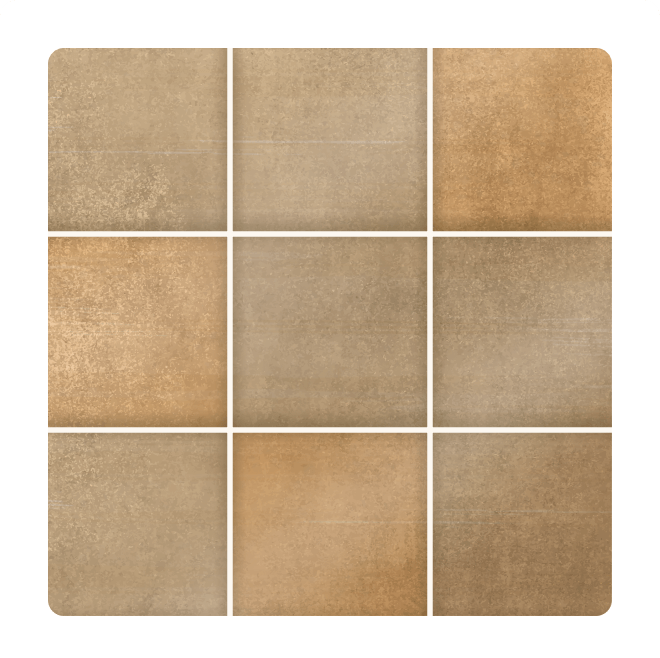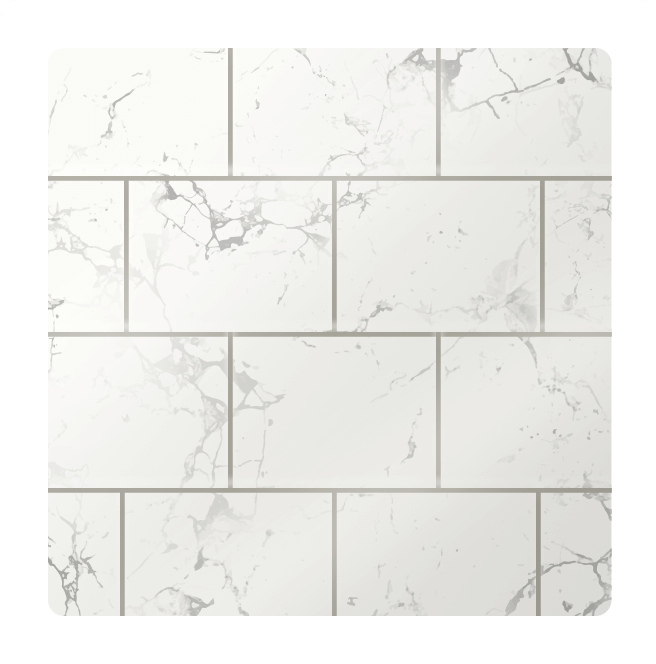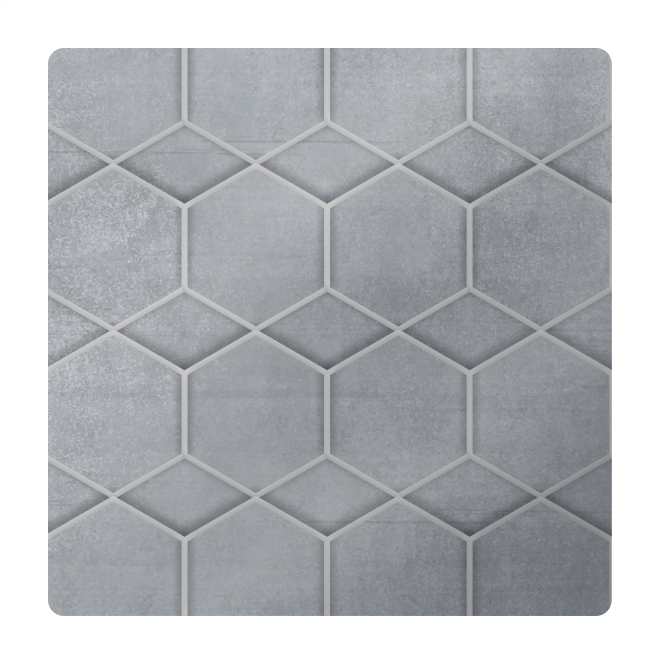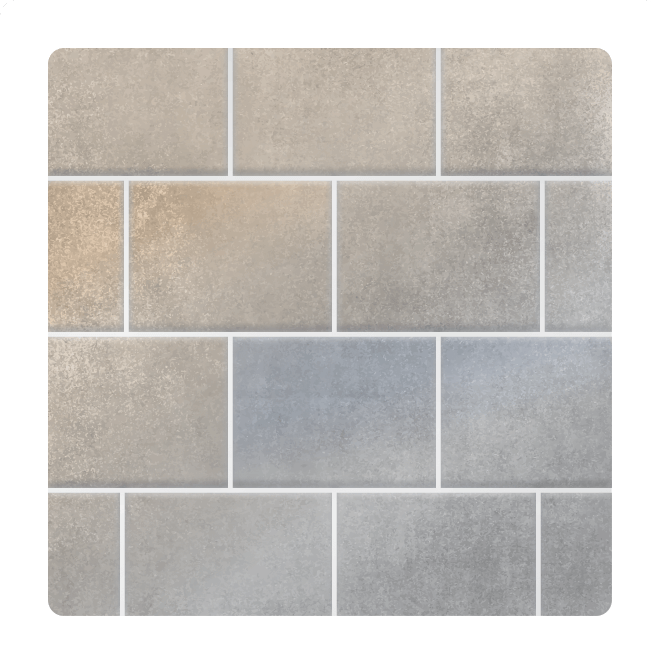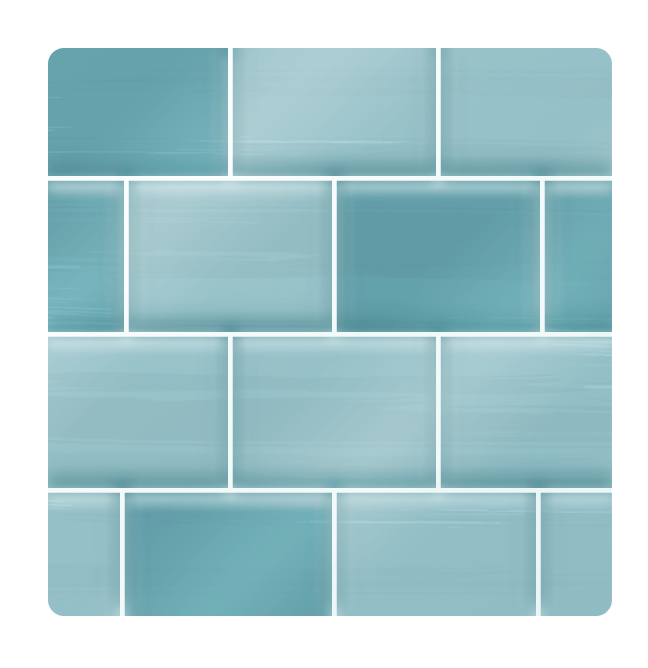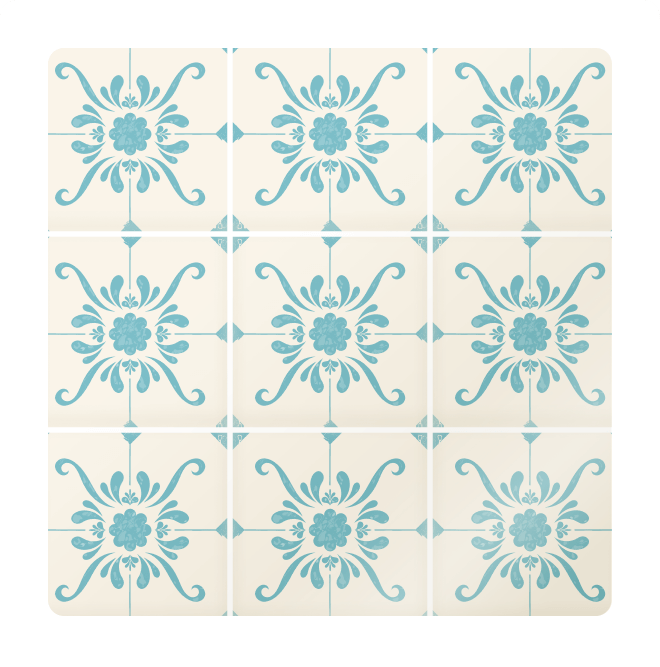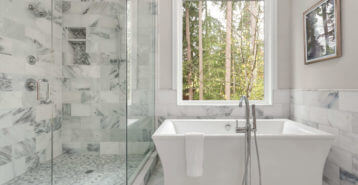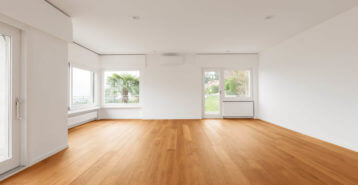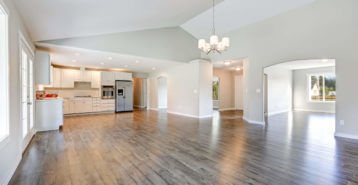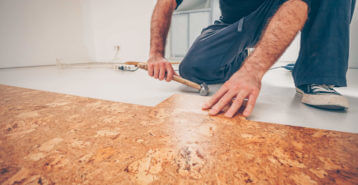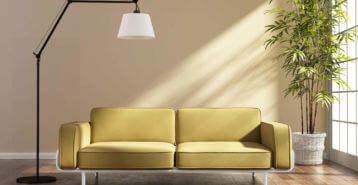Bathrooms, kitchens, laundry rooms, living rooms and even swimming pools—what they all have in common is they most likely all have pieces of tile. Tile is a versatile material that can be used for flooring, countertops and backsplashes. It comes in a variety of types, colors and textures, making it the perfect choice for creating just about any aesthetic you desire in your home. There are notable differences among types of tiles; depending on your lifestyle and style preferences, these differences can determine which will be a better for for your home than others.
On this page we will go over the different types of tile, their costs, durability, designs and longevity. These features can help you decide which type of tile is best for your next home improvement, whether you are tackling a flooring, backsplash, or countertop project.
Ceramic Tile
Ceramic tiles are found everywhere in the home, thanks to their durability and wide variety of colors and shapes available.
This type of tile is made by quarrying the materials and forming it into a mold, then putting a glaze on top to make it scratch and stain resistant. This also helps keep water out, which is why it is a very popular choice for bathrooms, kitchen and laundry rooms. In fact, ceramic tile can be used in about any room of the home.
Ceramic tile costs just $2 to $5 per square foot to install on average, making one of the most affordable types of tile. It is just slightly less waterproof and durable than porcelain tile, but is more cost-friendly. It is not advisable to use ceramic tile in outdoor spaces.
Porcelain Tile
A type of ceramic tile, porcelain tile tends to run a bit more expensive than non-porcelain.
Porcelain is made the same way as ceramic, by being molded and then glazed over with a material that makes it scratch and stain resistant. However, porcelain tile is fired at a higher temperature, making it harder and less porous and more waterproof (with a 0.5% moisture absorption rate). This is why porcelain tile is a very popular choice for rooms that have a lot of water, such as bathrooms, kitchens, and laundry rooms.
Porcelain tends to be slightly more durable and resistant to cracking than ceramic tiles, but costs slightly more at $3 to $10 per square foot on average. It can be used in outdoor settings if needed.
Concrete Tile
While solid concrete floors are available to homeowners, concrete tile flooring is also an option.
Cement-based concrete tiles are becoming increasingly popular for flooring because they are easy to install, extremely durable, eco-friendly, and can be refinished easily. Not to mention, they come in a wide variety of textures, patterns, and colors, and are very affordable at just $3 to $6 per square foot.
Concrete tiles are going to be more porous compared to ceramic and porcelain tiles, meaning they are more likely to absorb water. For this reason, they may not be the best choice for your bathroom, and will likely need to be resealed every three years. When concrete tile has been well cared for it, can last more than a lifetime. In fact, concrete tiles are more durable than most types of hardwood floors.
Natural Stone Tile
This type of tile is a popular choice for people who want to hone in on the authentic beauty of natural stone. Types of natural stone tiles include marble, granite, limestone, travertine and slate.
Natural stone tiles also provide details such as veining, making each piece unique from one to the next. The care for each stone is going to vary, as well as its ability to hold up against stains. Some natural stones require a sealant, which preserves it for longer but can make it slippery in high-traffic areas.
While these tiles are still quarried, they are not molded. They are simply cut to size to maintain the beauty of the natural material. Natural stone tile surfaces are completed with a natural, honed or polished finish.
While natural stone is eco-friendly and offers a one of a kind look, it is one of the more costly types of tile for flooring. The cost per square foot of natural stone tile varies depending on the specific type of stone.
- Travertine tiles: $2.30 to $9.25 per square foot
- Limestone tiles: $1.85 to $11.30 per square foot
- Slate tiles: $6.35 to $12.50 per square foot
- Marble tiles: $3.50 to $15.25 per square foot
- Granite tiles: $3.85 to $20 per square foot
Keep in mind that natural stone is porous and more susceptible to moisture and water than ceramic and porcelain tiles. Sandstone is among the most absorbent type of natural stone tile, while some types of granite tiles are almost waterproof. All in all, natural stone tiles are often better suited to backsplashes and even kitchen countertops, where they are less likely to be damaged by foot traffic and water.
Glass Tile
Since glass is water resistant and easy to clean, it is a top choice for beautiful bathroom or kitchen backsplashes.
While ceramic tiles have a very low water absorption rate, usually 0.5% to 3%, glass tile absorbs 0% water. Glass tiles are also translucent in color, which allows them to reflect light beautifully and give rooms an airy feel. Due to its higher cost, glass tile is best for small areas in the bathroom and kitchen, such as backsplashes and accent walls.
Glass tile is constructed differently than ceramic tile. It is made up of thin slabs of glass and glazed over. However, just like your mirrors, it can be easy to leave marks and fingerprints on your glass tiles, and scratching is a possibility. Be sure to maintain and clean it properly on a regular basis.
Mosaic Tile
While mosaic tiles are most often used as shower or backsplash tiles, they can also be used as a unique type of flooring.
Mosaic is durable, eco-friendly, easy to maintain, and resistant to most chemicals. Like concrete, mosaic also comes in a wide variety of colors, textures and patterns. This can truly give your home a sense of creativity and flair. Using colorful mosaic tiles in smaller rooms can help to brighten up the space and even make it appear larger.
Mosaic tiles are on the costlier end of the pricing spectrum. They can cost as much as $16 to $30 per square foot installed. For this reason, it is best to reserve mosaic tiles for flooring in smaller rooms or accent areas that you truly want to show off as unique. You can also use a small amount of mosaic as a shower or kitchen backsplash to keep costs lower.
Because mosaic tiles tend to be small, they are somewhat more fragile compared to other types of tile. You may not want to install mosaic tile flooring in rooms with heavy foot traffic. They can also become slippery when wet, so make sure to apply a non-slip sealer if you use them for flooring.
Compare top-rated flooring pros in your area.
Read real homeowner reviews, explore qualifications, and view promotions. Modernize makes it easy to browse professionals and find one that will be perfect for your project.
